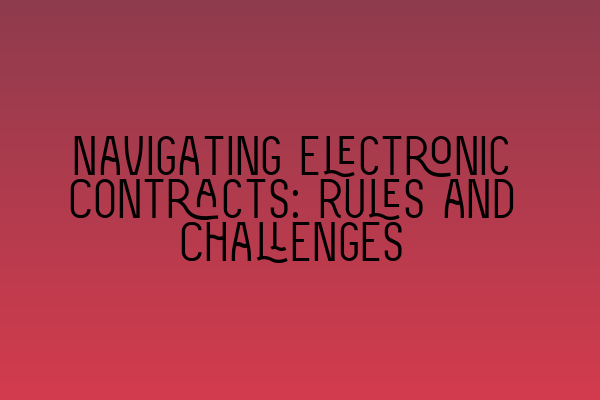Navigating Electronic Contracts: Rules and Challenges
In today’s digital age, electronic contracts have become an essential part of modern business transactions. These contracts offer convenience, efficiency, and flexibility, allowing parties to enter into agreements without the need for physical documents or face-to-face meetings. However, navigating the world of electronic contracts comes with its own set of rules and challenges.
In this blog post, we will explore some key aspects of electronic contracts, highlighting the important rules to consider and the challenges that may arise. Whether you are a solicitor, a business owner, or simply someone interested in contract law, this post will provide valuable insights into the world of electronic contracts.
1. Understanding Electronic Contracts
Let’s start by understanding what electronic contracts are. An electronic contract is a legally binding agreement created, signed, and stored in electronic form. It encompasses all types of contracts, including purchase agreements, employment contracts, service agreements, and more. The fundamental principles of contract law still apply to electronic contracts, but there are additional considerations to keep in mind.
2. Legal Validity
One of the primary concerns with electronic contracts is ensuring their legal validity. In most jurisdictions, electronic contracts are deemed legally valid as long as certain conditions are met. These conditions typically include the consent of both parties, the ability to accurately identify the parties involved, and the availability of a reliable electronic record.
To ensure legal validity, it is crucial to comply with the applicable electronic signature laws in your jurisdiction. These laws define the requirements for electronic signatures, such as the use of unique identifiers, authentication methods, and secure storage. Familiarize yourself with these laws and ensure compliance to avoid any potential challenges in the future.
3. Contract Formation
Electronic contracts can be formed in various ways, including through email exchanges, online form submissions, and digital platforms. Unlike traditional contracts, where parties physically sign a document, electronic contracts rely on electronic signatures or other forms of authentication. When drafting or entering into an electronic contract, it is important to clearly outline the intention to be legally bound and specify the necessary elements of a valid contract.
It is also advisable to include clauses regarding the use of electronic communication, data storage, and dispute resolution methods in the contract. These clauses will help clarify the rights and responsibilities of each party, as well as reduce the potential for misunderstandings or disputes.
4. Storage and Retention
Another challenge in navigating electronic contracts is the storage and retention of electronic records. In many jurisdictions, there are specific requirements for retaining electronic records to ensure their authenticity and integrity. It is important to have robust document management systems in place to securely store and retrieve electronic contracts in compliance with these requirements.
Additionally, it is good practice to regularly backup electronic records to safeguard against potential data loss or breaches. Consider implementing a data backup and recovery plan to mitigate the risk of losing important contract information.
5. Enforceability and Jurisdiction
Enforcing electronic contracts can sometimes be complex, especially when multiple parties are involved and different jurisdictions are applicable. It is essential to clearly specify the governing law and jurisdiction in the contract to determine which laws will apply in case of disputes.
Consider including an arbitration or mediation clause in your contracts to facilitate a more efficient and cost-effective resolution process. These alternative dispute resolution methods can help parties avoid lengthy and costly courtroom battles.
Conclusion
Electronic contracts offer numerous benefits in today’s digital world, but they also come with their own set of rules and challenges. Understanding the legal validity, contract formation, storage, retention, and enforceability aspects of electronic contracts is crucial for both solicitors and business owners.
By familiarizing yourself with the rules and potential challenges surrounding electronic contracts, you can navigate this territory with confidence. Keeping up with the latest laws and best practices will ensure that your electronic contracts are legally valid, enforceable, and provide a solid foundation for your business transactions.
If you want to dive deeper into contract law and preparation for the Solicitors Qualifying Examination (SQE), check out our related articles:
1. SQE 1 Practice Exam Questions
2. SQE 1 Practice Mocks FLK1 FLK2
3. SQE 2 Preparation Courses
4. SQE 1 Preparation Courses
5. SRA SQE Exam Dates
These resources will provide comprehensive insights into contract law, prepare you for the SQE exams, and help you stay updated with the latest exam dates.
Stay informed, stay prepared, and embrace the world of electronic contracts in your legal practice or business ventures.
